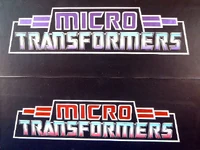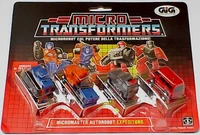(→Micromaster Sixteams: The redirect led to the action master.) |
|||
| Line 130: | Line 130: | ||
**[[Windy]] |
**[[Windy]] |
||
*[[Sixturbo]] |
*[[Sixturbo]] |
||
| − | **[[Circuit]] |
+ | **[[Circuit (Micromaster)|Circuit]] |
**[[Discharge]] |
**[[Discharge]] |
||
**[[Glide]] |
**[[Glide]] |
||
Revision as of 03:44, 27 July 2008
| Specifics: Commercial screengrab |
Micromasters are Transformers who downsized their bodies considerably to be more fuel-efficient. Transforming into tiny cars, planes, and other vehicles, they are depicted as roughly human-sized in robot mode in most continuities.
Some Micromasters are also Combiners, and can each form either the front or back half of a combined vehicle. They are not constrained to joining only with their Combiner partner; they also can join with any other Micromaster Combiner, as well as to the back of any Micro Trailer. (See also Combi-Micromaster.)
US Generation 1
The Micromasters were first released in the US and European markets in the two final years of the Generation 1 toyline, 1989 and 1990. These Micromasters were either grouped as Patrols, Squads, Transports, Stations or Bases:
Micromaster Patrols
The Patrols consist of four stand-alone Micromasters whose alt modes generally have a recurring common theme—for example, military vehicles in the case of the Military Patrol, or planes and helicopters in the case of the Air Patrol. The Patrols came carded in four-packs beginning in 1989, with a couple following in 1990.
Autobots
- Off Road Patrol (Highjump, Mudslinger, Powertrain, and Tote)
- Race Car Patrol (Tailspin, Free Wheeler, Roadhandler, and Swindler)
- Rescue Patrol (Seawatch, Stakeout, Fixit, and Red Hot)
- Battle Patrol (Big Shot, Sidetrack, Sunrunner, and Flak)
- Construction Patrol (Neutro, Groundpounder, Crumble, and Takedown)
- Air Patrol (Sky High, Eagle Eye, Blaze Master, and Tread Bolt)
- Monster Truck Patrol (Hydraulic, Slow Poke, Big Hauler, and Heavy Tread)
- Hot Rod Patrol (Big Daddy, Trip-Up, Greaser, and Hubs)
Decepticons
- Air Strike Patrol (Nightflight, Storm Cloud, Whisper, and Tailwind)
- Sports Car Patrol (Detour, Blackjack, Hyperdrive, and Road Hugger)
- Race Track Patrol (Roller Force, Barricade, Ground Hog, and Motorhead)
- Military Patrol (Bombshock, Tracer, Dropshot, and Growl)
Micromaster Combiner Squads
The Micromaster Combiners are Transformers that only form a half of a vehicle and therefore need their respective Combiner partner to form a full vehicle. Due to standardized connection plugs, any Micromaster Combiner can connect to any other Micromaster Combiner (an ability that was actively advertised in the TV commercials and other media), though often this does not make much sense. (The rear half of a dump truck connected to the front half of a space shuttle isn't anything you can win a war with, eh?) The Combiner Squads consist of six Micromaster Combiners, thus making three vehicles in their alt mode. They were initially released in 1990.
Autobots
- Metro Squad (Wheel Blaze, Roadburner, Oiler, Slide, Power Run, and Strikedown)
- Astro Squad (Phaser, Blast Master, Moonrock, Missile Master, Barrage, and Heave)
Decepticons
- Battle Squad (Meltdown, Half-Track, Direct-Hit, Power Punch, Fireshot, and Vanquish)
- Constructor Squad (Stonecruncher, Excavator, Sledge, Hammer, Grit, and Knockout)
Micromaster Transports
The Transports are single Micromasters that come with a transforming additional vehicle with which they can interact in some way. Flattop transforms into a jet and comes with an aircraft carrier, whereas the other three transform into trucks and pull transforming trailers. Except for Erector's trailer, all the additional vehicles transform into jets. They were released in 1989.
Autobots
Decepticons
Micromaster Combiner Transports
The Combiner Transports consist of a pair of Micromaster Combiners and a big transforming trailer. Each trailer can optionally transform into a big battle station or into two separate fighting vehicles, each manned by one of the Combiners. Like all Micromaster Combiners, they came out in 1990.
Autobots
- Missile Launcher with Retro and Surge
- Tanker Truck with Pipeline and Gusher
Decepticons
- Cannon Transport with Terror-Tread and Cement-Head
Micromaster Stations
The stations are big bases commanded by a single Transformer and disguised as human buildings. Hot House's station stands out a bit, as it is mobile in its alternate mode instead of being a stationary base. The stations were released in 1989.
Autobots
Decepticons
Micromaster Bases
The Micromaster Bases are huge fighting vehicles that transform into even bigger battle stations. They are commanded by a single Micromaster. Countdown's and Skystalker's vehicles are a big chunk taller than those of Groundshaker and Skyhopper, indicating that these two should be seen as the respective leaders of their Micromaster factions. Released in 1989.
Autobots
Decepticons
Micromaster Combiner Bases
Released in 1990, the Combiner bases were big vehicles commanded by a combiner duo. While the Decepticon Anti-Aircraft Base is pretty similar in concept to the previous year's Bases (transforming from a tank into a battle station), the Battlefield Headquarters lacks a base mode, instead transforming from an earthbound vehicle (a truck) into two airborne ones (a space shuttle and a attack jet).
Autobots
- Battlefield Headquarters with Full-Barrel and Overflow
Decepticons
- Anti-Aircraft Base with Blackout and Spaceshot
Japanese Generation 1
Japan as well released lots of Micromasters during their Zone, Return of Convoy and Operation Combination toylines (and later rereleases during Micromaster Collection). Most of them were identical to their western releases, but some were recolored or renamed and most Decepticons were depicted as Autobots. Next to this, the characterization they received in fiction differed heavily from their Western appearances, depiciting them as childish, young and inexperienced compared to the bigger transformers. See Microtransformers.
Micro Trailer
- Big Truck Team (Hydraulic, Slow Poke, Big Hauler, and Heavy Tread)
- Hot Rod Team (Big Daddy, Trip-Up, Greaser, and Hubs)
- Military Team (Bombshock, Tracer, Dropshot, and Growl)
- Shuttle Rocket W Team (Phaser, Blast Master, Moonrock, Missile Master))
- Fire Tanker W Team (Wheel Blaze, Roadburner, Oiler, Slide)
- Radar Hover W Team (Barrage, Heave, Power Run, Strikedown)
- Dump Shovel W Team (Hammer, Sledge, Grit, Knockout)
- Crane Cannon W Team (Direct-Hit, Excavator, Power Punch, Stonecruncher)
- Jet Tank W Team (Fireshot, Vanquish, Meltdown, Half-Track)
- Rescue Patrol Team (Boater, Fire, Holi, Pīpō)
- Battle Patrol Team (Gunlift, Sidetrack, Sunrunner, and Powerbomb)
- Super Car Patrol Team (Black Heat, Deadhour, Gingham, Road Hugger
Micromaster Sixteams
Apart from releasing US-made Micromasters, Takara also developed the Micromaster concept further on their own, resulting in the Micromaster Sixteams, Micromasters that combined in robot mode to form a bigger robot similar to the full-size Transformer combiners.
Autobots
Decepticon
Universe
The Micromasters returned to Western markets in 2004 in the wake of Universe with the release of redecoed Japanese Generation 1 Micromaster Sixteams. Those Combiner teams were generally given the names of old Generation 1 Full-size Combiners (except for Rail Racer, who has no equivalent in Generation 1).
Autobots
- Defensor (Slightly redecoed Sixturbo)
- Rail Racer (Redecoed Sixtrain)
- Superion (Redecoed Sixwing)
Decepticon
- Constructicon Devastator (Redecoed Sixbuilder)
Trivia

Absolutely, positively not inspired by Micro Machines. No sir. Not at all.
- An early name for the original Micromasters line was simply "Micro Transformers", having been featured on the packaging of the early 1989 Micromaster Patrols. The name was quickly dropped in favor of the now more common "Micromasters", possibly due to its similarity to Galoob's "Micro Machines".

GiG continues on its parade of weirdness.
- Interestingly, Hasbro's early logo was used for the entirety of Italian company GiG's release of the Micromasters figures.

